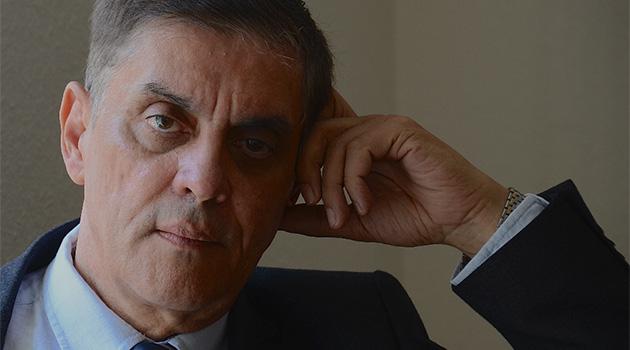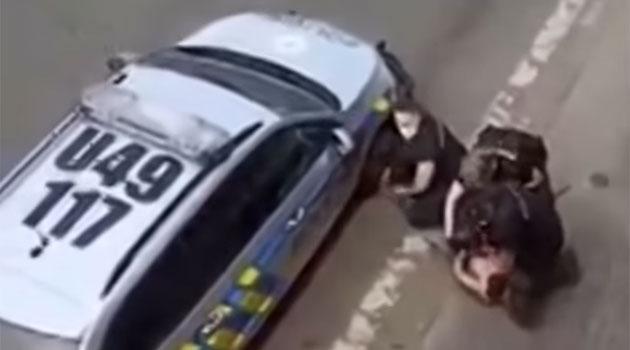Romani Rose, head of the Central Council of German Sinti and Roma: Czech Police intervention in Teplice was abhorrent, brutal, and inhumane

Romani Rose, head of the Central Council of German Sinti and Roma, says Saturday’s intervention by the Czech Police in Teplice, after which a Romani man, Stanislav Tomáš, collapsed and died, was abhorrent, brutal, and inhumane. The Council, which brings together ethnic Sinti and Roma in the Federal Republic of Germany, sees a similarity to the case of the Black man George Floyd, who died in the USA last year in May after a police officer knelt on his neck for several minutes.
Mr Rose told the Czech News Agency (ČTK) that he has delivered a letter about the case to the Czech Ambassador to Germany, Tomáš Kafka, for delivery to Czech Interior Minister Jan Hamáček and has already asked German Foreign Affairs Minister Heiko Maas for a meeting to discuss the matter. Mr Rose last met Maas on the occasion of a commemorative ceremony at a memorial to the Holocaust and its Jewish victims that was also attended by US Secretary of State Antony Blinken.
“I have asked Maas for a meeting,” Mr Rose told the Czech wire service. Czech Ambassador Kafka has confirmed that he received the head of the Central Council.
After that meeting, Mr Rose told ČTK he had given Kafka the letter for the Czech Interior Minister. “I clearly expressed our expectations in the letter addressed to the Czech Interior Minister,” he said.
“Our main demand is that this be investigated by an independent commission, as well as that corresponding measures be taken against the unacceptable behavior of the police officers,” Mr Rose told ČTK. The Czech Police have been rejecting the idea that there could be any association whatsoever between their intervention and the death of Mr Tomáš, and according to representatives of the Ústecký Regional Police Directorate, the methods of force that were used by the officers corresponded to the intensity of what they are calling his attack.
According to a police spokesperson, the court-ordered autopsy did not reveal injuries to Mr Tomáš’s organs or that strangulation had occurred, but did reveal that he had methamphetamine in his body. Czech Ambassador Kafka told ČTK that he promised Mr Rose the embassy would help deliver the letter to the Czech Interior Minister.
The Czech Ambassador to Germany also told ČTK that he agreed with Mr Rose on the necessity of the case being investigated impartially. In his press statement about the intervention, Mr Rose said it showed an “inhumane method that is incomprehensible in its abhorrence and brutality.”
Mr Rose also told ČTK that it had been unbearable for him to watch the video recording. “Those torturous cries that gradually got weaker and weaker until they went absolutely quiet – I have to say, that was intolerable,” he said.
“I told the ambassador that police steps of that kind have no place in a democratic society, we have different methods, we cannot allow interventions by police to kill people in the streets,” Mr Rose said. “I myself would not have survived such an experience either.”
In the view of the Central Council chair, it is also unacceptable that Czech Interior Minister Hamáček and Prime Minister Andrej Babiš have so hastily, and so soon after the incident, backed the police without any proof, given that the investigation is still ongoing. “It is not possible that they behave in this populist way, they are responsible for the whole society,” Mr Rose said, adding that the deceased Romani community member was also a Czech citizen.
In the Central Council’s statement, they mention that the police have reported that Mr Tomáš had behaved aggressively. They then contrast that statement with the video footage filmed by eyewitnesses from which it is apparent, in their view, that one officer knelt on the 46-year-old man’s neck for six minutes and did not stop kneeling even after the detainee was no longer making any noise.
In conclusion, the Central Council states that there are approximately 250 000 to 300 000 Romani people living in the Czech Republic and that they “suffer discrimination and social exclusion”. The Council of Europe and the Czech branch of the Amnesty International human rights organization have also called for an independent, thorough investigation of the death of Mr Tomáš.
Czech Deputy Public Defender of Rights Monika Šimůnková also intends to investigate the police intervention. The Czech Police officers were called to the scene on Saturday afternoon in Teplice because two men were brawling in the street and damaging cars that did not belong to them.
Mr Tomáš resisted arrest and the officers used force against him, after which they say he died in an ambulance called to the scene. The Czech Police are rejecting the idea that their method of immobilizing him could have contributed to his death.
